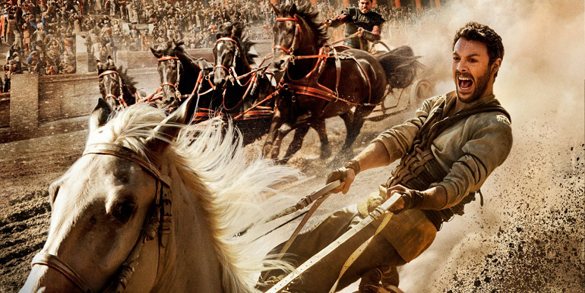Ben-Hur (3D) **

Ben-Hur (1959) was a true Oscar-winning epic (eleven in total), earning the epitome “bigger than Ben-Hur” for any movie since made to be compared against. These are mighty shoes indeed to fill for any studio willing to step up to the challenge. Enter Paramount’s 2016 remake into the Roman arena.
Although like-titled Ben-Hur (2016) strives to capture the grandiose thrill of the infamous chariot race, it needed to be bigger, “much bigger than Ben-Hur (1959)”. It ought to hang its head in thin imitation shame, regardless of how much its leads, Jack Huston (as Judah Ben-Hur, the embattled Jewish prince) and Toby Kebbell (as Messala Severus, the aggrieved Roman officer) try in vain to be larger-than-life screen actors than they are.
The 2016 film needs a cast with gravitas, long the lines of Russell Crowe in Ridley Scott’s Gladiator. In fact, re-recruit the leads and director (Russian Timur Bekmambetov of Wanted fame). The only one who can stay is dreadlocked Morgan Freeman as horses betting man Ilderim, complete with that ever gleefully naughty twinkle in his eye, who always commands an impressive screen presence, doing very little for his paycheck here.
For those not au fait with the plot, Ben-Hur from Jerusalem (set in Jesus’s time on Earth – played here by Rodrigo Santoro) is from a wealthy noble family who takes in an orphaned Roman boy called Messala Severus and raises him as its own. The competitive boys grow up together, but an accident spurs an older Messala to leave the family home and join the Roman Army to prove his worth.
Years later, Messala, now a high-ranking Roman Army officer returns by Pontius Pilate’s side (played by Pilou Asbaek of A Hijacking fame), riding through Jerusalem. Ben-Hur is warned in advance by his adopted brother to stop any possible threat to the Roman visit from those who opposed Roman rule. But an attack on the party results in Ben-Hur being falsely accused of treason by Messala.
Ben-Hur is banished to be a gallon slave for five years, but a terrifying fate sets him free. A chance meeting with horse dealer Ilderim puts him in a position to seek revenge by competing against his estranged adopted brother in a chariot race, hosted by Pilate. Only one man can win – and survive.
The latest incarnation lacks the real passion and strife of the 1959 film, though it has plenty of more gore to elevate it above a tame Sunday-School educational affair. The religious aspect is very much present, complete with a physical Christ and crucifixion. To be honest, Santoro’s presence just sparks suppressed giggles in the context of things when he appears, rather than deity awe.
Huston is not hungry enough for revenge like Charlton Heston’s Ben-Hur was. He’s certainly not happy being in the midst of Bekmambetov’s shipwreck of special effects, but he just seems a tad ‘unfazed’ by his brutal experience to be convincing – and no amount of muttering words of encouragement helps either. That’s not to say he won’t win some fans battling all elements in this. He does give the part as much as he can.
Kebbell fares better. He has the appropriate petulant scowl needed. However, like his brother in arms, Huston, he is even less convincing in terms of sheer strength needed to be a true chariot racer in the arena. This is meant to be a very physical film, in terms of action and effects. It just feels like latter-day CGI – which Bekmambetov does have an aptitude for in previous work – does not do this project justice. In fact we’ve been thoroughly spoilt by CG in action films to the point where we expect characters defy gravity most of the time, as is the case here.
Bekmambetov and scriptwriters Keith R. Clarke and John Ridley have taken Lew Wallace’s novel and flattened it, rather than given it a new lease of life for a latter-day audience. Yes, Christianity is still a major factor, but showing Jesus does not seem to add anything messianic, really. They needed to go with their convictions, full throttle down the religious route, rather than flimsily injecting it, for fear of putting off less faith-led latter-day audiences.
Ben-Hur (2016) is still consumable – if you haven’t seen the 1959 powerhouse version – as the two leads try their damndest to command a real screen presence. However, the film itself lacks spirit. Bekmambetov’s subdued cinematography does make the whole affair feel rather ‘televised’, rather than like an old-school, silver-screen epic, which is a crying shame with such iconic material. Is it a case of biting off more than the studio can chew?
2/5 stars
By @FilmGazer